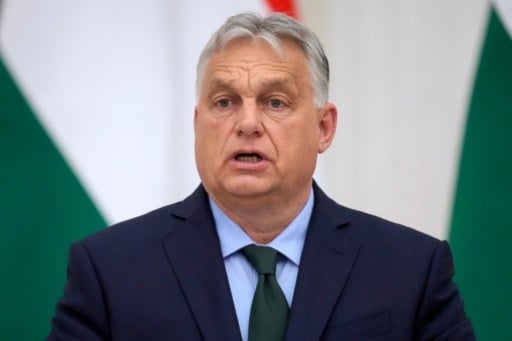Russia developed financial flexibility in response to sanctions: Orban
Despite losing the ability to import agricultural products from the West due to sanctions, Russia has become the largest exporter of food products within a few years.
-

Hungarian Prime Minister Viktor Orban attends a joint news conference with Russian President Vladimir Putin following their talks in the Kremlin in Moscow, Russia, Friday, July 5, 2024. (AP)
In an interview with the Romanian broadcaster M1 on Saturday, Hungarian Prime Minister Viktor Orban on Saturday dismissed allegations that Russia is an autocracy, that the country has adapted to Western sanctions and shown economic and social resilience.
"Russia has learned lessons since 2014 and not only learned them but also turned them into actions. They carried out the necessary development of the IT and banking sector, so the Russian financial system did not break down. They have developed the ability to adapt," Orban.
The official noted that, despite losing the ability to import agricultural products from the West due to sanctions, Russia has become the largest exporter of food products within a few years.
"When Russia is described as a rigid neo-Stalinist autocracy, it is a lie. In fact, we are talking about a country that demonstrated technical, economic and, as you can see, maybe social flexibility," Orban said.
He further said that the West has called on the entire world to take action against Russia, but instead, support for Russia has gradually increased.
Orban also mentioned that while he was not surprised by the support from China and the DPRK, he was taken aback by the positions of Iran, India, Turkey, and the Muslim world, which now consider Russia a partner.
Read more: Russian economy immune to sanctions: The Economist
Earlier in July, Orban embarked on a "peace mission" tour, visiting Russia, Ukraine, and China, where he met with leaders to present his vision for a peace process.
Sources familiar with the matter told Politico that the EU's legal service informed member states that Orban's actions violated agreements that prohibit any measures "which could undermine the achievement of the Union's objectives."
At the same time, the Hungarian leader is reported to have violated a provision that mandates all members to conduct foreign policy "unreservedly in a spirit of loyalty and mutual solidarity."
His meeting with US presidential candidate Donald Trump while serving as the rotating president of the EU likewise caused controversy among EU members.
Upon completing his visits to China and Russia, European Parliament members asked that Hungary's right to vote in EU elections be taken away.
Prime Minister Orban "has already caused significant damage by exploiting and abusing the role of the Council Presidency," 63 MEPs said in a letter obtained by Politico and addressed to European Commission President Ursula von der Leyen, European Council President Charles Michel, and European Parliament Chief Roberta Metsola.
Read more: Hungary not in 'right reference group' in EU: Finland FM

 3 Min Read
3 Min Read








